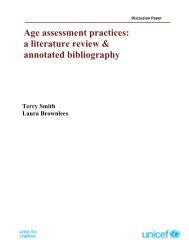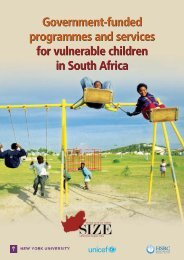Third and Fourth Periodic Report on CRC - Unicef
Third and Fourth Periodic Report on CRC - Unicef
Third and Fourth Periodic Report on CRC - Unicef
Create successful ePaper yourself
Turn your PDF publications into a flip-book with our unique Google optimized e-Paper software.
<str<strong>on</strong>g>Third</str<strong>on</strong>g> <str<strong>on</strong>g>and</str<strong>on</strong>g> <str<strong>on</strong>g>Fourth</str<strong>on</strong>g> <str<strong>on</strong>g>Periodic</str<strong>on</strong>g> <str<strong>on</strong>g>Report</str<strong>on</strong>g><br />
(2) In every police stati<strong>on</strong> at least <strong>on</strong>e officer with aptitude <str<strong>on</strong>g>and</str<strong>on</strong>g> appropriate training <str<strong>on</strong>g>and</str<strong>on</strong>g> orientati<strong>on</strong> may be designated<br />
as the 'juvenile or the child welfare officer' who will h<str<strong>on</strong>g>and</str<strong>on</strong>g>le the juvenile or the child in coordinati<strong>on</strong> with the police.<br />
(3) Special juvenile police unit, of which all police officers designated as above, to h<str<strong>on</strong>g>and</str<strong>on</strong>g>le juveniles or children will be<br />
members, may be created in every district <str<strong>on</strong>g>and</str<strong>on</strong>g> city to co-ordinate <str<strong>on</strong>g>and</str<strong>on</strong>g> to upgrade the police treatment of the juveniles<br />
<str<strong>on</strong>g>and</str<strong>on</strong>g> the children."<br />
It may not be out of place to menti<strong>on</strong> that in Engl<str<strong>on</strong>g>and</str<strong>on</strong>g> the Juvenile Court has lost its original name <str<strong>on</strong>g>and</str<strong>on</strong>g> character, inasmuch<br />
as it is now called the "Youth Court" <str<strong>on</strong>g>and</str<strong>on</strong>g> deals exclusively with juvenile offenders, i.e. delinquent children, <str<strong>on</strong>g>and</str<strong>on</strong>g> does not deal<br />
with neglected children <str<strong>on</strong>g>and</str<strong>on</strong>g> their care <str<strong>on</strong>g>and</str<strong>on</strong>g> custody matters. Many commentators are of the view that the policies followed<br />
by the United Kingdom in respect of children, including the aboliti<strong>on</strong> of the presumpti<strong>on</strong> in favour of 10-14 year olds under<br />
comm<strong>on</strong> law, menti<strong>on</strong>ed above, are in breach of the United Kingdom’s treaty obligati<strong>on</strong>s under the UN<strong>CRC</strong>. [See "Youth<br />
Justice? Half a Century of Resp<strong>on</strong>ses to Youth Offending" by Caroline Ball, a law professor at University of East Anglia,<br />
published in Oct 2004 in the 50th anniversary editi<strong>on</strong> of the Criminal Law Review, 2004 Criminal Law Review at p.36]<br />
On the other h<str<strong>on</strong>g>and</str<strong>on</strong>g> Scotl<str<strong>on</strong>g>and</str<strong>on</strong>g> has a different outlook to its dealings with children. We may quote from an article published <strong>on</strong><br />
the internet by the BBC, which reads as follows:<br />
"Scotl<str<strong>on</strong>g>and</str<strong>on</strong>g> has an unique way of dealing with children who commit offences. They are not treated as criminals to be<br />
punished, but as young people with problems who can be helped to overcome these. Their whole family is involved.<br />
They all have to go to a meeting with a group of three people, known as a Panel. These are specially trained lay men<br />
<str<strong>on</strong>g>and</str<strong>on</strong>g> women who volunteer to carry out this work. They are helped by a legally qualified official called the <str<strong>on</strong>g>Report</str<strong>on</strong>g>er whose<br />
office manages the caseload <str<strong>on</strong>g>and</str<strong>on</strong>g> who advises Panel members where a point of law is c<strong>on</strong>sidered.<br />
The Panel <str<strong>on</strong>g>and</str<strong>on</strong>g> family discuss not just the offending behaviour, but also the circumstances of the family as a whole - are<br />
the parents have (sic.) difficulties coping with their children, are there problems at school, etc. Other people can also be<br />
involved, such as teachers, social workers <str<strong>on</strong>g>and</str<strong>on</strong>g> the police. After hearing all of the circumstances of the case, the panel<br />
can then decide what help to put in place to support the family. In extreme cases where the child's behaviour has been<br />
violent, that can include taking the boy or girl out of the home <str<strong>on</strong>g>and</str<strong>on</strong>g> sending them to a secure unit run by a local authority.<br />
The theory behind the Children's Hearings system is that criminal behaviour can be nipped in the bud if dealt with at an<br />
early enough stage. It's well recognised that all children go through a rebellious phase in their teens. Many commit minor<br />
crimes, such as shoplifting or petty theft, <str<strong>on</strong>g>and</str<strong>on</strong>g> there is a c<strong>on</strong>tinuing problem in some areas with truancy. However, families<br />
can also find themselves in fr<strong>on</strong>t of a Panel for other reas<strong>on</strong>s. A parent could have a drink or drugs problem, there may<br />
be physical or sexual abuse in the home, or the child could be affected by bullying at school, either as victim or assailant.<br />
Panel members are trained to investigate the family <str<strong>on</strong>g>and</str<strong>on</strong>g> c<strong>on</strong>fr<strong>on</strong>t the child with the c<strong>on</strong>sequences of his or her behaviour.<br />
Unlike a juvenile court where <strong>on</strong>ly the facts of a case are judged, where guilt or innocence are determined <str<strong>on</strong>g>and</str<strong>on</strong>g><br />
punishment meted out, the Hearings will look at the case in the l<strong>on</strong>ger term. They will bring the family back several times<br />
to look at how their circumstances are changing <str<strong>on</strong>g>and</str<strong>on</strong>g> whether the behaviour of the young pers<strong>on</strong> has improved. It means<br />
that the family feels that it is c<strong>on</strong>stantly under observati<strong>on</strong>, that it's being challenged to change. In the majority of cases,<br />
the system works. It works in part because the young people would have grown out of their "criminal" phase in any case<br />
- it simply accelerates the process. It also works because it does not burden either the child or its family with a criminal<br />
record. It has no l<strong>on</strong>ger-term c<strong>on</strong>sequences that might stop some<strong>on</strong>e from getting a job or going <strong>on</strong> into higher<br />
educati<strong>on</strong>. When the Children's Hearings system was created, the aim was to clear away the legal formality <str<strong>on</strong>g>and</str<strong>on</strong>g> make<br />
everything as child friendly as possible."<br />
The Youth Courts set-up after the Criminal Justice Act 1991 in Engl<str<strong>on</strong>g>and</str<strong>on</strong>g> have similar provisi<strong>on</strong> relating to pers<strong>on</strong>s who will<br />
hear cases brought against juveniles.<br />
158
















